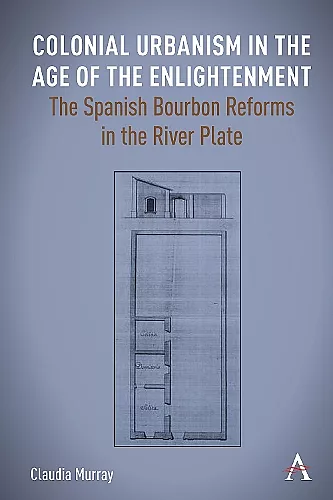Colonial Urbanism in the Age of the Enlightenment
The Spanish Bourbon Reforms in the River Plate
Format:Hardback
Publisher:Anthem Press
Published:6th Jun '23
Should be back in stock very soon

Tells the story of how the monarchy aimed at creating a new capital city in a remote and forgotten area of the empire and shows how the local Creole bourgeoisie rapidly assumed the role of urban developers and enhanced their economic status by investing in and controlling the Buenos Aires’ property market.
This book tells the story of how the monarchy aimed at creating a new capital city in a remote and forgotten area of the empire. It also shows how the local Creole bourgeoisie rapidly assumed the role of urban developers, and enhanced their economic status by investing in and controlling the Buenos Aires’ property market. In a short period, from 1776 to 1810, the urban transformation of Buenos Aires helped increase the Crown’s revenues and considerably reduced contraband trade. Nevertheless, urban changes generated an internal struggle for power for the control of the city between the Spanish loyalist and the local wealthier Creoles. As this book concludes, for an empire such as the Spanish, which was built upon a network of cities, the Crown’s loss of the control of Buenos Aires’ urban space was a serious threat to its power that foreshadowed Argentina’s wars of independence.
“Written in a clear engaging way and beautifully illustrated, this excellent original scholarly study of Buenos Aires in the late eighteenth century based on archival research not only adds greatly to our knowledge of the history of urban planning and architecture in Latin America but also reveals new thinking about how societies were seeking to reflect their status on the eve of independence.” — Linda Newson, Emeritus Professor, Centre for Latin American and Caribbean Studies, University of London, UK.
“This book presents a compelling account of the material and urban impacts of ‘enlightened’ reform in the late eighteenth-century viceroyalty of the Río de la Plata, especially in the city of Buenos Aires. The author’s archival research and use of theoretical frameworks for understanding the Enlightenment, including those of Max Weber, Michel Foucault, Theodoro Adorno and Max Horkheimer, allow for critical interpretation that should be of interest to the fields of Latin American urban history and geography.” — Paul B. Niell, Ph.D., Clark Professor, Clark Library and Center for 17th and 18th Century Studies, University of California, Los Angeles, USA.
ISBN: 9781785279812
Dimensions: 229mm x 153mm x 26mm
Weight: 454g
258 pages